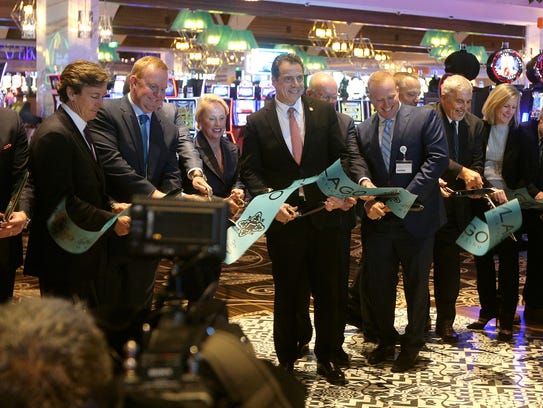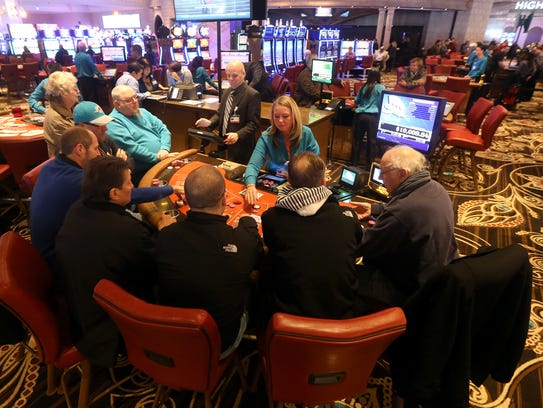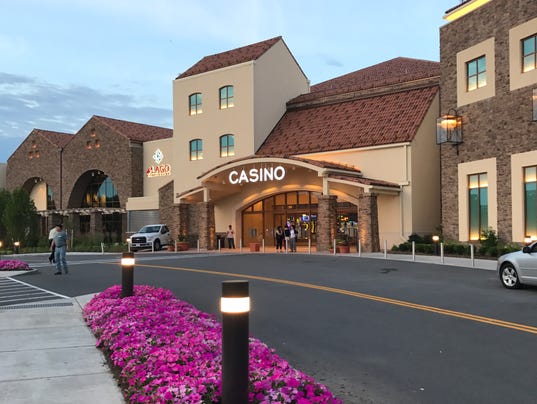A first inside look at the del Lago Resort & Casino, which opens to the public on Wednesday. Shawn Dowd
For people with a gambling problem, the first three steps to recovery are to admit they need help, believe a higher power can right them, and place their future in its hands.
Del Lago casino owner Tom Wilmot has those steps covered.
“I think we need some help at this point, and what the future holds, time will tell,” Wilmot said the other day in Albany, where he went hat in hand to the Capitol for “assistance” to offset lower-than-projected revenues.
Unfortunately for taxpayers, Wilmot is appealing to the wrong higher power.
When Wilmot anted up to the state casino siting board in 2013 for one of three gaming licenses, he knew he was gambling on entering a crowded field — or at least he should have.
There are 16 casinos in New York, including del Lago Resort and Casino, and most of them are run by Native American tribes that aren’t subject to the same state levies as commercial casinos. There are also nine racetracks with slots machines, known as racinos.
Six of these operations are within an hour’s drive of del Lago, which opened last year in Seneca County off the Thruway. One of them is the mammoth Turning Stone Resort Casino, whose scale and panache dwarf some Las Vegas destinations.
Now Wilmot has a problem.
Del Lago missed revenue estimates by 44 percent in its first year, pulling in $147 million of the $250 million that was anticipated. It was the largest revenue shortfall of the three upstate casinos that opened a year ago.
More: Del Lago casino, struggling with revenue, seeks state bailout
More: Upstate casinos end first year well short of projections
The fourth step in the recovery process is taking a fearless moral and financial self-inventory. Moody’s Investor Services took care of that for Wilmot with a scathing report that downgraded the ability of del Lago to cover its debts.
"Given del Lago’s current performance, Moody’s is of the view that without a substantial improvement in revenue, del Lago will not be able to achieve a level of performance that can support its existing debt capital structure,” the report read.
The fifth step is for the problem gambler to admit to himself and others where he went wrong. Wilmot isn’t there yet.
Instead of conceding he made a bad business decision opening a $440 million casino in a saturated market, Wilmot is blaming the Seneca Nation of Indians for his misfortune.
Specifically, he claims the tribe is stealing would-be del Lago patrons with money it is improperly withholding from the state.
The Senecas stopped making contractual payments to the state last year, claiming they fulfilled their obligations under a 2002 compact that allowed them to open casinos in Western New York in exchange for sharing slot-machine revenues with the state.
 Buy Photo
Buy PhotoDignitaries including Gov. Andrew Cuomo (center) cut a ribbon at the grand opening of del Lago Resort and Casino in Tyre, NY, in this file photo. (Photo: Jamie Germano/@jgermano1/Staff Photographer)
In 2012, Gov. Andrew Cuomo and the Senecas extended their gaming compact through 2023, but the state’s lawyers crapped out when they apparently overlooked extending the payment schedule beyond 2017.
“What are they doing with that newfound windfall?” Wilmorite spokesman Steven Greenberg asked? “Using more than $50 million to provide additional promotions and incentives — particularly in the Rochester area — to lure customers from del Lago.”
Wilmot wouldn’t say what sort of “help” he wanted, but he likely wants a break on taxes or del Lago’s revenue sharing, which is higher than that of the Native American casinos.
More: Bad bet? Del Lago far behind first-year revenue projections
More: House wins big with casino tax breaks
How Cuomo will respond to del Lago's ask for help isn’t certain. He may cave in to save face, particularly since he foolishly made casinos a centerpiece of his upstate economic revitalization plan.
But upon Wilmot and other developers receiving the rights to build their casinos in 2014, Cuomo addressed the possibility that the new ventures may underperform by noting the state wasn’t providing any financing.
“The state is not putting in a penny,” he said. “We don’t have any money on the table. It is only upside for the state.”
Del Lago counts 1,200 employees, which is not insignificant. But the flipside is that casinos are a known form of regressive taxation that takes the largest chunk out of the wallets of people who can least afford it.
A recent report from the Rockefeller Institute of Government at the State University of New York found that long-term growth in state revenues from gambling slows or declines. Another report from the Center for Gaming Research at the University of Nevada-Las Vegas labeled Atlantic City “a city in crisis.”
 Buy Photo
Buy PhotoA picture from the first day of the del Lago Casino in Tyre, Seneca County, in February. (Photo: Jamie Germano/@jgermano1/File photo)
Outside the Capitol, Wilmot lamented, “We’re just not hitting the numbers.” Well, neither are most of del Lago’s customers. There just aren’t enough of them to help Wilmot hit his.
Like giving a degenerate gambler another chip, propping up del Lago with corporate welfare will only perpetuate the larger problem of relying on casinos for economic growth.
The sooner Wilmot is made to deal with his gambling problem on his own, the sooner he'll reach the twelfth and final step of the recovery program: Spreading the word that casinos are a losing bet.
David Andreatta is a Democrat and Chronicle columnist. He can be reached at This e-mail address is being protected from spambots. You need JavaScript enabled to view it .
Read or Share this story: https://on.rocne.ws/2Ge8iSU
| < Prev | Next > |
|---|







 Copyright © 2024 ToCasino.net Online Casino. All Rights Reserved. Designed by
Copyright © 2024 ToCasino.net Online Casino. All Rights Reserved. Designed by